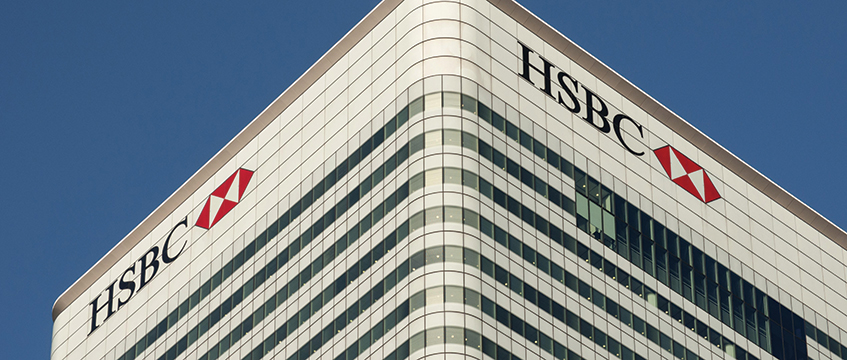Sovereign wealth fund the Qatar Investment Authority is nearing a £625m refinancing of the HSBC Tower in Canary Wharf.
A club of six banks have come together to provide the new five-year loan secured against the building at 8 Canada Square, E14. Deka, Deutsche Bank, Bank Imi, Bank of America Merill Lynch, Crédit Agricole and HSBC itself are each providing around £104m to the deal. The financing is expected to close in the next couple of weeks.
The loan-to-value ratio of the finance sits at 60% with a margin of close to 150bps over Libor. The latest valuation of the building stands at close to £1.04bn. This is a drop of around 11.5% since 2014 when QIA bought the building for £1.175bn from National Pension Service of Korea. The HSBC Tower is one of only a handful of buildings in the Canary Wharf estate that is not owned by Canary Wharf Group, in which QIA owns a 50% stake alongside Brookfield.
The 1.1m sq ft skyscraper is let to the bank until 2027, with a £1.09bn sale-and-leaseback having been agreed with Metrovacesa in 2007, although the bank has an option to break the lease in 2022. The predominant reason for the fall in value of the asset since QIA purchased the building is the shortening of the unexpired lease since then, and while it is expected that HSBC will not leave the building, it has not yet had to commit formally. As a result, the terms of the loan deal include a large amount of amortisation to protect the lenders.
QIA’s 2014 purchase was financed with a £705m, five-year loan that was put in place the following year and is due to expire in just over a year’s time. It was provided around 40% by Qatar National Bank, 40% by Lloyds and 20% by Deka at a somewhat lower margin of close to 135bps. QNB and Lloyds will be repaid, while Deka, the only lender from the previous deal that is committing to the new one, will see its exposure to the building reduced by around £37m.
By refinancing a year ahead of the maturity of the existing loan, QIA is able to take advantage of the current low-margin lending environment and ensure security over the asset, without having to pay early repayment penalties.
One financier close to the deal told EG that they had been put off from participating by the relatively short unexpired period left on the lease to break and the outside threat that the bank could make a dramatic decision to relocate parts of its operations to its strongholds in Asia.
It is understood that BAML, Bank Imi and Crédit Agricole had initially agreed the refinancing as a trio, at a lower margin of around 130bps, with plans to syndicate the deal, but ultimately it was not finalised as the three banks determined there was not enough interest from the market to sell on the debt at that price.
Deutsche’s surprise inclusion
Deutsche Bank’s participation may be considered somewhat of a surprise by the market, with the German investment bank’s traditionally higher cost of capital seeing it priced out of holding on to such low-margin deals. However, it is understood that the commercial real estate division has been provided with a new source of capital to lend from within the bank to allow it to compete in this area of the market. Deutsche is being put under pressure by Cerberus, which is both a 3% owner of the bank as well as acting as an adviser to it, to generate an extra €300m (£257.3m) per annum by investing cash sitting in the business into relatively low-risk areas.
To send feedback, e-mail david.hatcher@egi.co.uk or tweet @hatcherdavid or @estatesgazette











